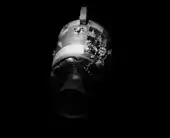Triskaidekaphobia
Triskaidekaphobia (/ˌtrɪskaɪˌdɛkəˈfoʊbiə/ TRIS-kye-DEK-ə-FOH-bee-ə, /ˌtrɪskə-/ TRIS-kə-; from Ancient Greek τρεισκαίδεκα (treiskaídeka) 'thirteen', and Ancient Greek φόβος (phóbos) 'fear')[1] is fear or avoidance of the number 13. It is also a reason for the fear of Friday the 13th, called paraskevidekatriaphobia (from Greek Παρασκευή (Paraskevi) 'Friday', Greek δεκατρείς (dekatreís) 'thirteen', and Ancient Greek φόβος (phóbos) 'fear') or friggatriskaidekaphobia (from Old Norse Frigg 'Frigg', Ancient Greek τρεισκαίδεκα (treiskaídeka) 'thirteen', and Ancient Greek φόβος (phóbos) 'fear').

The term was used as early as in 1910 by Isador Coriat in Abnormal Psychology.[2]
Origins
Norse mythology
According to folklore historian Donald Dossey, the unlucky nature of the number "13" originated with a Norse myth about 12 gods having a dinner party in Valhalla. The trickster god Loki, who was not invited, arrived as the 13th guest, and arranged for Höðr to shoot Balder with a mistletoe-tipped arrow. Dossey: "Balder died, and the whole Earth got dark. The whole Earth mourned. It was a bad, unlucky day." This major event in Norse mythology caused the number 13 to be considered unlucky.[3][4]
Judas theory
From the 1890s, a number of English language sources have related the "unlucky" number thirteen to an idea that at the Last Supper, Judas, the disciple who betrayed Jesus, was the 13th to sit at the table.[5] The Bible says nothing about the order in which the Apostles sat, but there were thirteen people at the table.
Events related to "unlucky" 13

- Apollo 13 was launched on April 11, 1970 at 13:13:00 CST and suffered an oxygen tank explosion on April 13 at 21:07:53 CST. It returned safely to Earth on April 17.[6][7]
- On Friday, October 13, 1307, the arrest of the Knights Templar was ordered by Philip IV of France. While the number 13 was considered unlucky, Friday the 13th was not considered unlucky at the time. The incorrect idea that their arrest was related to the phobias surrounding Friday the 13th was invented early in the 21st century and popularized by the novel The Da Vinci Code.[8]
- In 1881 an influential group of New Yorkers, led by US Civil War veteran Captain William Fowler, came together to put an end to this and other superstitions. They formed a dinner cabaret club, which they called the Thirteen Club. At the first meeting, on January 13, 1881, at 8:13 p.m., thirteen people sat down to dine in Room 13 of the venue. The guests walked under a ladder to enter the room and were seated among piles of spilled salt. Many "Thirteen Clubs" sprang up all over North America over the next 45 years. Their activities were regularly reported in leading newspapers, and their numbers included five future US presidents, from Chester A. Arthur to Theodore Roosevelt. Thirteen Clubs had various imitators, but they all gradually faded due to a lack of interest.[9]
- Friday the 13th mini-crash
- Vehicle registration plates in Ireland are such that the first two digits represent the year of registration of the vehicle (i.e., 11 is a 2011 registered car, 12 is 2012, and so on). In 2012, there were concerns among members of the Society of the Irish Motor Industry (SIMI) that the prospect of having "13" registered vehicles might discourage motorists from buying new cars because of superstition surrounding the number thirteen, and that car sales and the motor industry (which was already failing) would suffer as a result. The government, in consultation with SIMI, introduced a system whereby 2013 registered vehicles would have their registration plates' age identifier string modified to read "131" for vehicles registered in the first six months of 2013 and "132" for those registered in the latter six months of the year.[10][11]1
- In July 2020, the 13th flight of Rocket Lab's Electron rocket failed to reach orbit during the second engine burn, resulting in a loss of vehicle. This was the first failure of an Electron rocket to cause the loss of a customer's payload and the second overall failure of the rocket.[12][13]
Effect on US Shuttle program mission naming

At first glance, it may seem surprising that an agency whose focus lies in science and technology should devote such an emphasis to an ancient superstition, but for one thing: the unlucky voyage of Apollo 13.
— Ben Evans (2012)[17]
STS-41-G was the name of the thirteenth Space Shuttle flight.[18] However, originally STS-41-C was the mission originally numbered STS-13[19][20] STS-41-C was the eleventh orbital flight of the space shuttle program.[21]
The numbering system of the Space Shuttle was changed to a new one after STS-9.[22] The new naming scheme started with STS-41B, the previous mission was STS-9, and the thirteenth mission (what would have been STS-13) would be STS-41C.[22] The new scheme had first number stand for the U.S. fiscal year, the next number was a launch site (1 or 2), and the next was the number of the mission numbered with a letter for that period.[22]
In the case of the actual 13th flight, the crew was apparently not superstitious and made a humorous mission patch that had a black cat on it.[22] Also, that mission re-entered and landed on Friday the 13th which one crew described as being "pretty cool".[22] Because of the way the designations and launch manifest work, the mission numbered STS-13 might not have actually been the 13th to launch as was common throughout the shuttle program; indeed it turned out to be the eleventh.[23][21] One of the reasons for this was when a launch had to be scrubbed, which delayed its mission.[24]
NASA said in a 2016 news article it was due to a much higher frequency of planned launches (pre-Challenger disaster).[22] As it was, the Shuttle program did have a disaster on its one-hundred and thirteenth mission going by date of launch, which was STS-107.[25] The actual mission STS-113 was successful, and had actually launched earlier due to the nature of the launch manifest.[26]
Omission of 13th rooms, floors and decks
Many ships, including cruise liners have omitted having a 13th deck due to triskaidekaphobia. Instead, the decks are numbered up to 12 and skip straight to number 14. Hotels, buildings and elevator manufacturers have also avoided using the number 13 for rooms and floors based on triskaidekaphobia.[27]
Famous people with triskaidekaphobia
Similar phobias

- Number 4 (Tetraphobia). In China, Taiwan, Singapore, Japan, Korea and Vietnam, as well as in some other East Asian and South East Asian countries, it is not uncommon for buildings (including offices, apartments, hotels) to omit floors with numbers that include the digit 4, and Finnish mobile phone manufacturer Nokia's 1xxx-9xxx series of mobile phones does not include any model numbers beginning with a 4 (except Series 40, Nokia 3410 and Nokia 4.2). This originates from Classical Chinese, in which the pronunciation of the word for "four" (四, sì in Mandarin) is very similar to that of the word for "death" (死, sǐ in Mandarin), and remains so in the other countries' Sino-Xenic vocabulary (Korean sa for both; Japanese shi for both; Vietnamese tứ "four" vs. tử "death").
- Friday the 13th (Paraskevidekatriaphobia or Friggatriskaidekaphobia) is considered to be a day of bad luck in a number of western cultures. In Greece and some areas of Spain and Latin America, Tuesday the 13th is similarly considered unlucky.2
- Number 17 (Heptadekaphobia). In Italy, perhaps because in Roman numerals 17 is written XVII, which can be rearranged to VIXI, which in Latin means "I have lived" but can be a euphemism for "I am dead." In Italy, some planes have no row 17 and some hotels have no room 17.[33]
- Number 39 (Triakontenneaphobia). There is a belief in some parts of Afghanistan that the number 39 (thrice thirteen) is cursed or a badge of shame.[34]
- Number 616 (Hexakosioihekkaidekaphobia) or 666 (Hexakosioihexekontahexaphobia).
Lucky 13
In some regions, 13 is or has been considered a lucky number. For example, prior to the First World War, 13 was considered to be a lucky number in France, even being featured on postcards and charms.[35] In more modern times, 13 is lucky in Italy except in some contexts, such as sitting at the dinner table.[36] In Cantonese-speaking areas, including Hong Kong and Macau, the number 13 is considered lucky because it sounds similar to the Cantonese words meaning "sure to live" (as opposed to the unlucky number 14 which in Cantonese sounds like the words meaning "sure to die"). Colgate University was started by 13 men with $13 and 13 prayers, so 13 is considered a lucky number. Friday the 13th is the luckiest day at Colgate.[37]
A number of sportspeople are known for wearing the number 13 jersey and performing successfully. On November 23, 2003, the Miami Dolphins retired the number 13 for Dan Marino, who played for the Dolphins from 1983-1999. In 1966, the Portugal national football team achieved their best-ever result at the World Cup final tournaments by finishing third, thanks to a Mozambican-born striker, Eusebio, who has scored nine goals at World Cup — four of them in a 5-3 quarterfinal win over North Korea — and won the Golden Boot award as the tournament's top scorer while wearing the number 13. In the 1954 and 1974 World Cup finals, Germany's Max Morlock and Gerd Müller, respectively, played and scored in the final, wearing the number 13.[38] More recent footballers playing successfully despite wearing #13, include Michael Ballack, Alessandro Nesta, and Rafinha.[39] Among other sportspeople who have chosen 13 as squad number, are the Venezuelans Dave Concepción, Omar Vizquel, Oswaldo Guillén and Pastor Maldonado.
Notes
- ^1 The main reason for this was stated to be to increase the number of car sales in the second half of the year. Even though 70% of new cars are bought during the first four months of the year, some consumers believe that the calendar year of registration does not accurately reflect the real age of a new car, since cars bought in January will most likely have been manufactured the previous year, while those bought later in the year will be actually made in the same year.
- ^2 Tuesday is generally unlucky in Greece for the fall of Byzantium Tues 29th May 1453.[40] In Spanish-speaking countries, there is a proverb: En martes no te cases, ni te embarques 'On Tuesday, do not get married or set sail'.[41]
References
- "triskaidekaphobia - Origin and meaning of triskaidekaphobia by Online Etymology Dictionary". Etymonline.com. Retrieved 5 November 2017.
- "Abnormal Psychology" p. 319, published in 1910, Moffat, Yard and company (New York). Library of Congress Control No. 10011167.
- Friday the 13th Superstitions Rooted in Bible and More, National Geographic
- Why is Friday the 13th Considered Unlucky?, Mental Floss
- Cecil Adams (1992-11-06). "Why is the number 13 considered unlucky?". The Straight Dope. Retrieved 2011-05-13.
- "13 Things That Saved Apollo 13, Part 9: Position of the Tanks - Universe Today". Universetoday.com. 21 April 2010. Retrieved 5 November 2017.
- "WHAT REALLY HAPPENED TO APOLLO 13 HOME PAGE". Spaceacts.com. Retrieved 5 November 2017.
- Robinson, John J. (1990). Born in Blood: The Lost Secrets of Freemasonry. ISBN 978-0-87131-602-8.
- Nick Leys, If you bought this, you've already had bad luck, review of Nathaniel Lachenmayer's Thirteen: The World's Most Popular Superstition, Weekend Australian, 8–9 January 2005
- 2013 number plates to be changed to avoid ‘unlucky 13’ , Irish Independent, 24 August 2012
- "2013 Number Plates To Be Changed To Avoid 'Unlucky 13'". Irish Independent.
- https://www.rocketlabusa.com/news/updates/rocket-lab-mission-fails-to-reach-orbit/
- https://arstechnica.com/science/2020/07/on-its-13th-launch-rocket-lab-loses-a-mission/?utm_brand=arstechnica&utm_source=twitter&utm_social-type=owned&utm_medium=social
- Almeida, Andres (5 December 2016). "Behind the Space Shuttle mission numbering system". nasa.gov. Retrieved 5 November 2017.
- Evans, Ben (1 June 2012). Tragedy and Triumph in Orbit: The Eighties and Early Nineties. Springer Science & Business Media. p. 211. ISBN 9781461434306.
- Evans, Ben (2007). Space Shuttle Challenger: Ten Journeys into the Unknown. ISBN 9780387496795. Retrieved 30 May 2012 – via Google Books.
- Evans, Ben (1 June 2012). Tragedy and Triumph in Orbit: The Eighties and Early Nineties. Springer Science & Business Media. p. 211. ISBN 9781461434306.
- "Challenger mission No. 6 (13th shuttle program mission overall)". Orlando Sentinel. 41-G. Retrieved 5 November 2017.
- "James D. A. van Hoften" (PDF). Oral History Project. NASA Johnson Space Center. 5 December 2007. Retrieved 20 July 2013.
- "Terry J. Hart" (PDF). Oral History Project. NASA Johnson Space Center. 10 April 2003. Retrieved 20 July 2013.
- "STS-41-C Information". Astonautix. Retrieved 28 December 2017.
- Almeida, Andres (5 December 2016). "Behind the Space Shuttle Mission Numbering System". NASA. Retrieved 17 January 2017.
- Evans, Ben (1 June 2012). Tragedy and Triumph in Orbit: The Eighties and Early Nineties. Springer Science & Business Media. ISBN 9781461434306.
- Evans, Ben (1 June 2012). Tragedy and Triumph in Orbit: The Eighties and Early Nineties. Springer Science & Business Media. p. 211. ISBN 9781461434306 – via Google Books.
- "The Columbia Disaster". Space Safety Magazine. Retrieved 28 December 2017.
- Warnock, Lynda. "NASA STS-113". KSC. nasa.gov. Retrieved 17 January 2017.
- "Cruise secrets: Why can passengers never find this mysterious location on a cruise ship?". www.express.co.uk. Retrieved 2020-09-30.
- "Fear of 13 and Other Superstitions Embedded in Compositions". WQXR-FM. May 13, 2016. Retrieved 2019-01-24.
- Perry, Warren. "Fears of the Fearless FDR: A President's Superstitions for Friday the 13th". Smithsonian Institution. Retrieved 2019-01-24.
- Haberman, Clyde (May 17, 2010). "A Reading to Recall the Father of Tevye". The New York Times. Retrieved 2019-01-24.
- Chan, Melissa. "Why Friday the 13th Is a Real Nightmare for Some People". Retrieved 8 December 2018.
- Tobias, Scott (March 29, 2016). "Film Review: 'The Fear of 13'". Variety. Retrieved 2019-01-24.
- Harris, Nick (15 November 2007). "Bad Omen for Italy as Their Unlucky Number Comes Up". The Independent. London.
- Jon Boone. "The curse of number 39 and the steps Afghans take to avoid it". The Guardian. Retrieved 28 December 2017.
- Davies, Owen (2018). A Supernatural War: Magic, Divination, and Faith During the First World War. Oxford: Oxford University Press. p. 136. ISBN 9780198794554.
- "Aggiungi un posto a tavola, siamo in 13!" [Add a seat at the table, we are 13!]. Di cibo e altre storie [Of food and other stories] (in Italian). 13 January 2012.
- "Lucky 13". Colgate University. Retrieved 20 February 2015.
- Dpa (1 July 2010). "Unlucky 13, unless your name is Mueller". Thehindu.com. Retrieved 5 November 2017.
- "Football Facts: Who Wears Number 13?". Thefootballnation.co.uk. Retrieved 5 November 2017.
- Margarita Papantoniou. "Why Are Tuesday and 13 Bad Luck?". GreekReporter. Retrieved 28 December 2017.
- "Tuesday the 13th… the Friday the 13th of the Spanish-speaking world (and vice-versa)". WordPress. Retrieved 28 December 2017.
External links
| Look up triskaidekaphobia in Wiktionary, the free dictionary. |
| Wikimedia Commons has media related to Triskaidekaphobia. |
- 'Unlucky' airline logo grounded BBC, 21 February 2007
- Would you buy a number 13 house? BBC Magazine, Friday, 12 December 2008
- Triskaidekaphobia on MathWorld
- Who's Afraid Of Friday The 13th? on NPR
